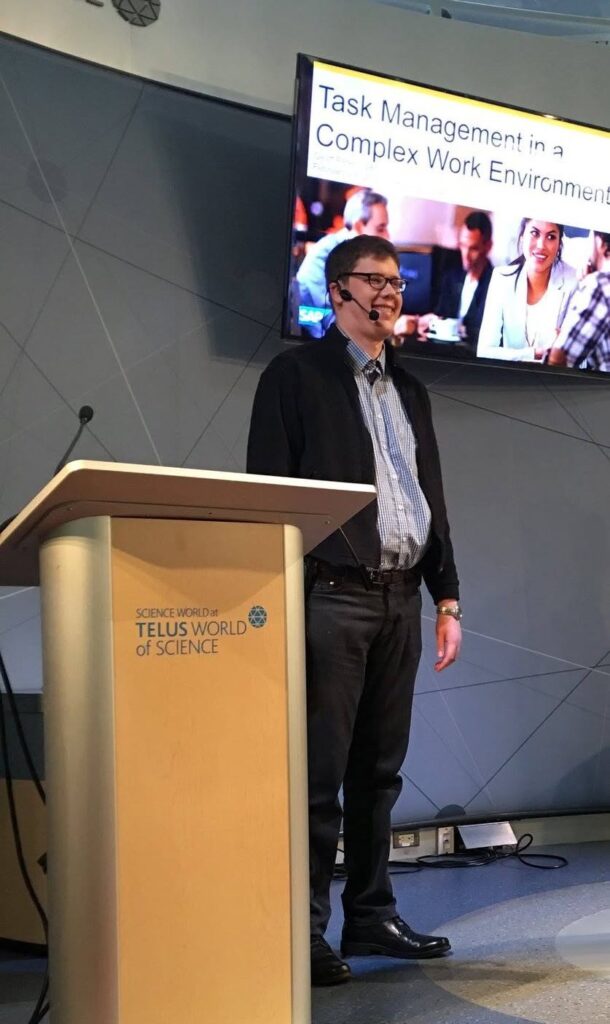I want to share with you a simple yet powerful process for managing your daily tasks and workflows that’s part of the Organize with Lists – OWL System. It’s called GSFA, which stands for Gathering, Sorting, Filtering, and Acting.

This process is designed to help you stay organized, reduce stress, and boost productivity. By the end of this post, you’ll have a clear understanding of how to apply GSFA in your own life.
Step 1: Gathering
The first step in GSFA is Gathering. This is where you collect or capture everything that needs your attention—from tasks and ideas to projects. It’s all about creating an inbox to capture your unfinished tasks and incomplete ideas, that you’ll review regularly. (See the appendix below on open loops).
Motivational speaker Les Brown puts it well, “You cannot get to where you want to go, if you don’t know where you are.” Gathering provides clarity by bringing together all your open tasks, ideas, and commitments into one central system.
Take a moment to reflect on everything that’s on your mind. Whether there are things you need to do for work, home, or personal projects, the gathering step ensures that you don’t forget anything. Write it all down, and keep it in one place. This will clear mental clutter and give you a fresh starting point.
As new ideas, triggers, potential actions, or projects arise over the course of your day, be sure to gather those into your system’s inbox so they don’t fall through the cracks.
Step 2: Sorting
Next, it’s time to Sort. This step involves setting dates for each task or project, deciding when you’ll work on it, or think about it, next. I like to call these the “action dates” – the date when you’d like to be reminded about or move forward on a particular action.
When you are assigning the action dates, anticipate if you’ll actually have time to take action on those dates, and take into consideration the due dates and deadlines for your projects.
Sort your list by action date, earliest first, to ensure that you prioritize your workload based on available time, urgency, and importance.
Entrepreneur Arianna Huffington reminds us, “Setting priorities is about making conscious choices about how we want to spend our time.” A sorted list will give you understanding of what you could work on first, while making sure that anything that absolutely must get done today doesn’t get lost in the mix.
As you review your tasks, consider what needs to be done immediately versus what can be delayed. Set realistic deadlines for yourself and consider “when would I like to think about this task next?” when you are setting your action dates. Be kind to your future self when you are setting the dates, and don’t shy away from setting some dates far into the future if the task doesn’t need to be moved on or considered in the short term.
Step 3: Filtering
The third step in GSFA is Filtering. Filter your tasks into relevant projects, lists, or groups.
Create a list for each project and move the related tasks into the right list. You can focus on one project at a time and review and organize its list, looking for ways to simplify, clarify the action steps, identify patterns, and understand the flows and dependencies.
Then, view your tasks from different perspectives. Look across all your projects for tasks due today, this week, or those that need immediate attention.
Alexander Graham Bell captured this perfectly: “Concentrate all your thoughts upon the work at hand. The sun’s rays do not burn until brought to a focus.” Filtering helps you eliminate distractions – by categorizing your tasks into groups you’ll be able to work smarter, not harder.
If you have a long or disorganized list, or don’t organize your tasks into projects, it’s easy to get overwhelmed. Filtering helps you break everything down into actionable chunks that you can focus on without feeling scattered.
Step 4: Acting
Finally, it’s time to Act. This is where you take action on your tasks. But first, you’ll need to choose which task to tackle based on your sorted and filtered lists.
Nelson Mandela understood this when he said, “Action without vision is only passing the time, vision without action is merely daydreaming, but vision with action can change the world.” Acting is where ideas turn into reality—whether it’s sending an email, making a call, or completing a small errand.
By using the sorted order and filtered views, you can identify which tasks are most urgent and important. Choose one task and commit to completing it. When you take action, you move projects forward and begin to see results, which fuels further progress.
Conclusion
In conclusion, GSFA is a powerful method for managing your tasks and workflows. By Gathering your ideas and tasks, Sorting them by action date, Filtering by category, and Acting on them, you can reduce stress, increase productivity, and achieve your goals.
Start applying GSFA in your own life today, and experience how this method can simplify your day-to-day tasks and help you stay on top of your goals.
Maya Angelou’s wisdom applies here: “Do the best you can, until you know better. Then, when you know better, do better.”
Get Geoff as Your Speaker
Interested in learning more about GSFA or other productivity strategies that are part of OWL – Organize with Lists? Geoff Peters, the co-creator of the GSFA method, is available for speaking engagements and workshops. Whether you’re hosting a corporate event, seminar, or team-building session, Geoff brings expert insights, real-world applications, and a dynamic presence to help your team improve their productivity and workflow.
Contact Geoff today to book him for your next event or workshop. Visit his LinkedIn to learn more and get in touch!
About the Author
Geoff Peters is a Senior Software Developer, Productivity Geek, and Musician based in Vancouver, Canada. Geoff co-created the GSFA method and the Organize with Lists – OWL System with his partner, Tony.
Connect with Geoff on LinkedIn or via the contact form.

Appendix – What are “Open Loops”?
In productivity systems, an open loop refers to any task, project, or idea that remains incomplete or needs further action. It’s a term popularized by David Allen in his book Getting Things Done (GTD). Open loops represent commitments, responsibilities, or obligations that circle back to you until addressed.
Examples of open loops include:
- Unfinished tasks or projects
- Unanswered emails or messages
- Unresolved issues or problems
- Pending decisions or actions
- Unmet goals or objectives
By using GSFA, you can Gather all these open loops, Sort them by action date, Filter by category, project, or priority, and then Act on them. Closing these loops gives you a sense of relief, mental clarity, and the ability to move forward with greater focus.